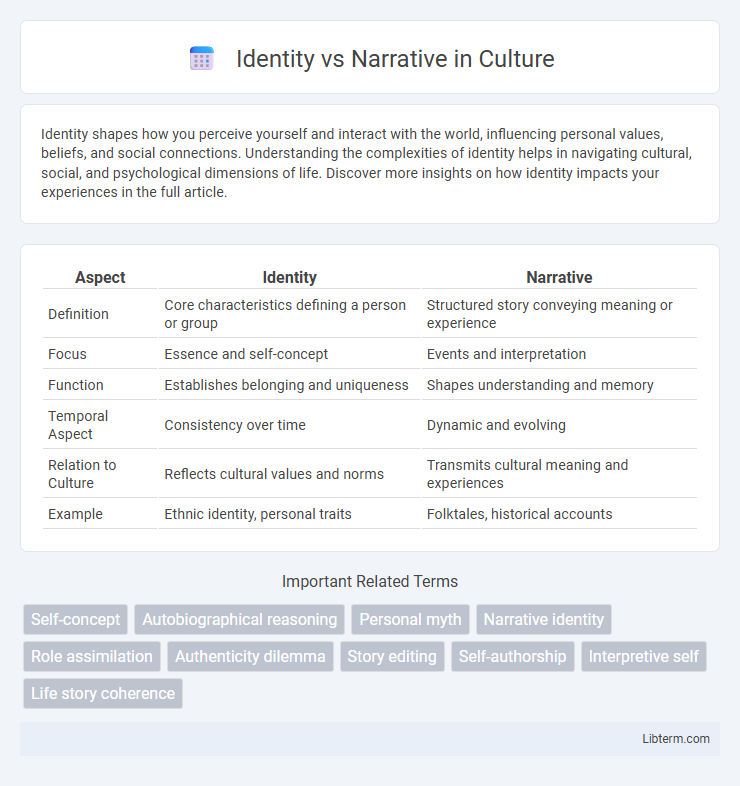Identity shapes how you perceive yourself and interact with the world, influencing personal values, beliefs, and social connections. Understanding the complexities of identity helps in navigating cultural, social, and psychological dimensions of life. Discover more insights on how identity impacts your experiences in the full article.
Table of Comparison
| Aspect | Identity | Narrative |
|---|---|---|
| Definition | Core characteristics defining a person or group | Structured story conveying meaning or experience |
| Focus | Essence and self-concept | Events and interpretation |
| Function | Establishes belonging and uniqueness | Shapes understanding and memory |
| Temporal Aspect | Consistency over time | Dynamic and evolving |
| Relation to Culture | Reflects cultural values and norms | Transmits cultural meaning and experiences |
| Example | Ethnic identity, personal traits | Folktales, historical accounts |
Understanding Identity: Core Concepts
Understanding identity involves recognizing the dynamic relationship between self-perception and social roles, where personal experiences and cultural contexts shape an individual's continuous sense of self. Core concepts include self-concept, which integrates beliefs and values about oneself, and narrative identity, the internalized story constructed to provide coherence and meaning to life events. This evolving integration supports psychological resilience and guides decision-making, emphasizing the importance of authentic narrative construction in identity development.
Defining Narrative: Stories We Tell Ourselves
Defining narrative involves understanding the coherent stories we tell ourselves to make sense of our identity and experiences. These internal narratives shape our perception of the past, influence present decisions, and guide future aspirations by providing meaning and continuity to our lives. Identity versus narrative explores how the stories constructed internally can either reinforce a stable sense of self or lead to conflict when personal experiences challenge established narratives.
Identity Formation Through Narratives
Identity formation is deeply influenced by the narratives individuals construct and internalize, shaping their self-concept and personal meaning. These narratives integrate past experiences, cultural context, and social relationships, enabling coherent self-understanding and continuity over time. Emerging psychological research highlights the role of autobiographical storytelling in reinforcing identity coherence and promoting mental well-being.
The Dynamic Relationship: Identity vs Narrative
The dynamic relationship between identity and narrative shapes how individuals construct their self-concept through evolving life stories. Identity serves as the internal core, while narrative provides the external framework to interpret experiences and give meaning to personal growth. This interaction drives continuous self-reflection and adaptation, influencing psychological well-being and social connections.
Social Influence on Personal Narratives
Social influence significantly shapes personal narratives by guiding how individuals interpret and recount their life experiences within cultural and social frameworks. Group norms, societal roles, and interpersonal feedback continuously inform identity construction, leading to narratives that reflect both personal agency and social expectations. These interactions contribute to evolving self-concepts that align with collective values and shared stories.
Narrative Identity in Psychology
Narrative Identity in psychology refers to the internalized and evolving story individuals construct to make sense of their lives and experiences. This concept integrates past memories, present understanding, and future aspirations to create a cohesive self-concept, influencing motivation and behavior. Researchers such as Dan P. McAdams emphasize the role of narrative identity in psychological well-being and personal meaning-making.
Cultural Narratives Shaping Collective Identity
Cultural narratives play a pivotal role in shaping collective identity by providing shared stories that reinforce group values, traditions, and historical experiences. These narratives create a framework through which communities interpret their past and envision their future, fostering social cohesion and continuity. The transmission of cultural narratives influences individual identity formation by embedding personal experiences within larger societal contexts.
Rewriting Personal Narratives for Growth
Rewriting personal narratives facilitates identity development by allowing individuals to reinterpret past experiences, leading to enhanced self-awareness and psychological growth. This process involves critically examining and reshaping the stories people tell about themselves to foster resilience and adaptive behaviors. Research shows that intentional narrative reconstruction can improve mental health outcomes by promoting a coherent and positive sense of self.
Challenges in Reconciling Identity and Narrative
Reconciling identity and narrative presents challenges as individuals often grapple with conflicting self-perceptions and external stories imposed by society. Fragmented narratives can disrupt a coherent sense of identity, leading to internal tension and identity confusion. Overcoming these challenges requires integrating diverse experiences into a unified self-concept while navigating social expectations and cultural frameworks.
Embracing Change: The Future of Identity Narratives
Embracing change reshapes identity narratives by integrating evolving social, cultural, and technological influences that challenge static self-perceptions. Dynamic identity construction incorporates diverse experiences, fostering authenticity and resilience amid globalization and digital transformation. Future identity narratives prioritize adaptability, reflecting continuous personal and collective growth in an interconnected world.
Identity Infographic

 libterm.com
libterm.com